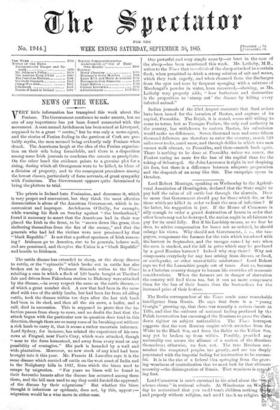The cattle disease has extended to sheep, or the sheep
disease to cattle, or the "epizootic" which broke out in cattle has also broken out in sheep. Professor Simonds writes to the Times retailing a case in which a flock of 120 lambs bought at Thetford fair and driven from Fakenham station to Blakeney were attacked by the disease, —in every respect the same as the cattle disease,— of which a great number died. A cow that had been in the same shed with two of the sickly lambs, but had been far from all ailing cattle, took the disease within ten days after the last sick lamb had been in its shed, and then all the six cows, a heifer, and a calf, died in succession. This is supposed to prove that the in- fection passes from sheep to cows, and no doubt the fact that the attack began with the particular cow in question does tend in this direction, though there are so many cases of its breaking out without a sick lamb to carry it, that it seems a rather uncertain inference. Lord Sydney, for instance, has related the experience of his own cows at Frognal, near Foot's Cray, which were attacked, though " near to the farm homestead, and away from every road or any possibility of contagion." His park is bounded by a wall and wide plantation. Moreover, no new stock of any kind had been brought into it this year. Mr. Francis II. Lascelles says it is the same disease which carried off cattle on the west coast of India and in the Neilgherry hills in 1847, from which the bison used to escape by migration. " For years no bison will be found in their favourite haunts after the disease has occurred among them there, and the hill men used to say they could foretell the approach of the disease by their migrations." But whether the bison thought it infectious or epidemic, does not, by this, appear ;— migration would be a wise move in either case. One powerful and very simple remedy—at least in the case of the sheep—has been mentioned this week. Mr. Letheby, M.B., writes to the Times that two-thirds of the sheep attacked in a certain flock, when permitted to drink a strong solution of salt and water, which they took eagerly, and when cleansed from the discharges from the eyes and nose by frequent sponging with a mixture of Macdougal's powder in water, have recovered,—showing, as Mr. Letheby very properly adds, " how barbarous and destructive is the proposition to 'stamp out' the disease by killing every infected animal."






























